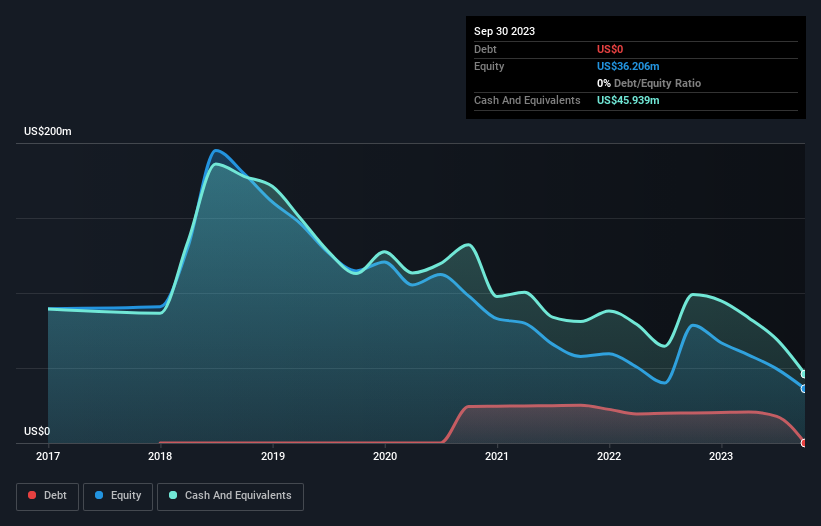Companies Like Unity Biotechnology (NASDAQ:UBX) Could Be Quite Risky
We can readily understand why investors are attracted to unprofitable companies. For example, biotech and mining exploration companies often lose money for years before finding success with a new treatment or mineral discovery. But while the successes are well known, investors should not ignore the very many unprofitable companies that simply burn through all their cash and collapse.
So should Unity Biotechnology (NASDAQ:UBX) shareholders be worried about its cash burn? In this article, we define cash burn as its annual (negative) free cash flow, which is the amount of money a company spends each year to fund its growth. Let's start with an examination of the business' cash, relative to its cash burn.
Check out our latest analysis for Unity Biotechnology
When Might Unity Biotechnology Run Out Of Money?
A cash runway is defined as the length of time it would take a company to run out of money if it kept spending at its current rate of cash burn. As at September 2023, Unity Biotechnology had cash of US$46m and no debt. In the last year, its cash burn was US$44m. Therefore, from September 2023 it had roughly 13 months of cash runway. That's not too bad, but it's fair to say the end of the cash runway is in sight, unless cash burn reduces drastically. The image below shows how its cash balance has been changing over the last few years.
How Is Unity Biotechnology's Cash Burn Changing Over Time?
Unity Biotechnology didn't record any revenue over the last year, indicating that it's an early stage company still developing its business. So while we can't look to sales to understand growth, we can look at how the cash burn is changing to understand how expenditure is trending over time. As it happens, the company's cash burn reduced by 4.5% over the last year, which suggests that management are maintaining a fairly steady rate of business development, albeit with a slight decrease in spending. While the past is always worth studying, it is the future that matters most of all. For that reason, it makes a lot of sense to take a look at our analyst forecasts for the company.
Can Unity Biotechnology Raise More Cash Easily?
Even though it has reduced its cash burn recently, shareholders should still consider how easy it would be for Unity Biotechnology to raise more cash in the future. Issuing new shares, or taking on debt, are the most common ways for a listed company to raise more money for its business. Many companies end up issuing new shares to fund future growth. By looking at a company's cash burn relative to its market capitalisation, we gain insight on how much shareholders would be diluted if the company needed to raise enough cash to cover another year's cash burn.
Unity Biotechnology's cash burn of US$44m is about 174% of its US$25m market capitalisation. That suggests the company may have some funding difficulties, and we'd be very wary of the stock.
So, Should We Worry About Unity Biotechnology's Cash Burn?
Even though its cash burn relative to its market cap makes us a little nervous, we are compelled to mention that we thought Unity Biotechnology's cash burn reduction was relatively promising. After looking at that range of measures, we think shareholders should be extremely attentive to how the company is using its cash, as the cash burn makes us uncomfortable. On another note, we conducted an in-depth investigation of the company, and identified 6 warning signs for Unity Biotechnology (2 are a bit unpleasant!) that you should be aware of before investing here.
Of course Unity Biotechnology may not be the best stock to buy. So you may wish to see this free collection of companies boasting high return on equity, or this list of stocks that insiders are buying.
Have feedback on this article? Concerned about the content? Get in touch with us directly. Alternatively, email editorial-team (at) simplywallst.com.
This article by Simply Wall St is general in nature. We provide commentary based on historical data and analyst forecasts only using an unbiased methodology and our articles are not intended to be financial advice. It does not constitute a recommendation to buy or sell any stock, and does not take account of your objectives, or your financial situation. We aim to bring you long-term focused analysis driven by fundamental data. Note that our analysis may not factor in the latest price-sensitive company announcements or qualitative material. Simply Wall St has no position in any stocks mentioned.

